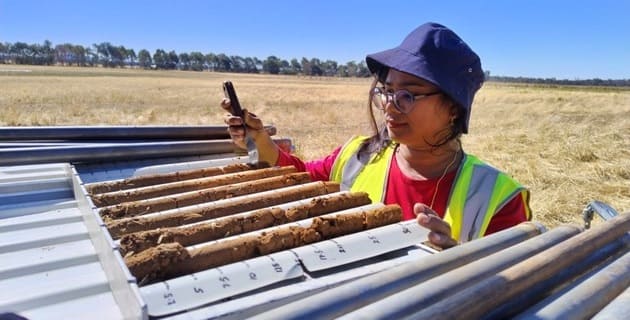A new multi-phase study is exploring a promising, sustainable solution to soil salinity – using bio-fertiliser-based organic amendments to restore balance, improve nutrient uptake and reduce salt stress in crops.

Soil salinity is a growing threat to agricultural productivity across Australia and the globe. Driven by natural processes and human activities, salinity depletes fertile land, disrupts plant growth and weakens soil ecosystems. But a new multi-phase study is exploring a promising, sustainable solution – using bio-fertiliser-based organic amendments to restore balance, improve nutrient uptake and reduce salt stress in crops.
Researchers are conducting controlled environment and field trials across two salt-affected sites in New South Wales to test how these amendments influence soil health and plant performance, with a focus on grain legume production. The findings could provide a powerful tool for farmers to reclaim saline land, increase yields and support long-term soil resilience.
This research aims to develop sustainable, organic solutions to rehabilitate saline soils, restore microbial function and enhance nutrient uptake and crop productivity. It offers a scalable approach to addressing soil degradation in Australia and beyond.
Research problem
Dryland salinisation – exacerbated by natural processes and poor historic land management – affects millions of hectares of Australian farmland. It limits nutrient availability, reduces crop yields and degrades soil microbiomes, with few sustainable solutions currently available.
Outcomes
The study will generate data on salinity levels, microbial activity and plant response across seasons. It will determine the effectiveness of bio-fertiliser-based organic amendments in improving soil health, reducing salt stress and promoting metabolite secretion in legumes.
Impact
By validating organic amendment strategies through lab and field trials, this research could lead to practical, environmentally friendly techniques for improving crop performance in saline soils, contributing to food security, climate resilience and sustainable land management.
Beneficiaries
Primary beneficiaries include Australian farmers managing saline land, agricultural researchers and policymakers. Broader impacts will extend to global farming communities, environmental restoration initiatives and supply chains seeking resilient crop production systems.
Charles Sturt University aligns our research, policies, procedures, and other work with the UN Sustainable Development Goals (SDGs). These are the most relevant SDGs for this initiative.